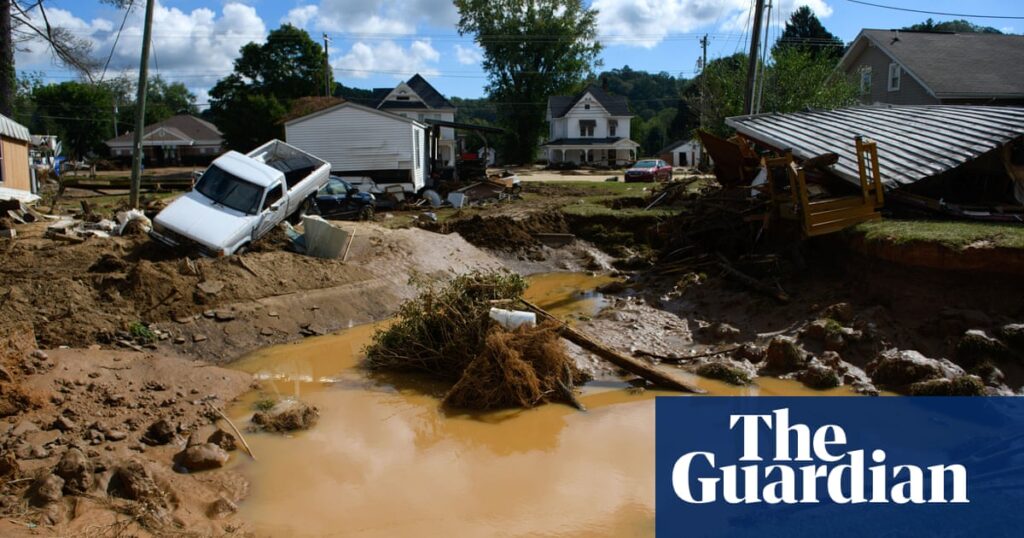As the southeastern United States continues to recover from the devastation of Hurricane Helen, the death toll from the storm continues to rise, with more than 120 people killed in multiple states.
Joe Biden will visit North Carolina on Wednesday, where the western part of the state has been devastated by flooding.
The president in recent days has pledged federal aid to aid recovery efforts and said his administration is “doing everything we can” to help states respond to the storm.
“This is not just a devastating storm. This is a historic, history-making storm,” Biden said Monday morning. “Hurricane damage has spread to at least 10 states,” he added.
Homeland Security Advisor Liz Sherwood Randall said Monday that up to 600 people could die, although the death toll has not yet been confirmed.
As of Monday morning, more than 1 million Americans remained without power in the Carolinas and Georgia.
Helen made landfall in Florida’s Big Bend area last Thursday night as a Category 4 hurricane. Although it weakened to a tropical storm before passing through Georgia, the Carolinas, and Tennessee, the storm’s winds, rainfall, storm surge, and flooding destroyed entire communities in its path.
The North Carolina Department of Public Safety announced Sunday that supplies such as food, water and other essentials were arriving in Asheville, a city in Buncombe County that has seen widespread destruction. The National Guard was also airlifting supplies to counties in western North Carolina, officials said.
“This is an unprecedented tragedy and requires an unprecedented response,” said North Carolina Governor Roy Cooper.
Federal Emergency Management Agency officials said Monday that hundreds of roads were closed across western North Carolina and more than 1,000 people were in shelters.
On Sunday’s CBS News, Federal Emergency Management Agency (Fema) Administrator Deanne Criswell called the North Carolina floods “historic,” adding: And the landslide they are experiencing now.
More than 500 National Guard troops assisted in more than 100 rescue operations in western North Carolina over the weekend, state officials said. At least 119 North Carolina residents and their pets were rescued.
Cooper said North Carolina’s death toll could rise as rescue workers and other emergency workers arrive in other isolated and devastated areas. He said more than 50 search teams were deployed across the region to search for stranded people. He urged residents in western North Carolina to avoid travel, primarily to clear roads for emergency personnel.
On Monday morning, Cooper appeared on CNN and said hundreds of roads had been destroyed and entire communities “wiped off the map.”
“We have to make sure we get in there and rebuild wisely and do it in a resilient way,” he said. “But right now, we are focused on saving lives and getting supplies to those who desperately need them.
“Many communities are completely cut off. By the way, the river is still rising, so the danger is not over and the flooding may not be over.”
The University of North Carolina at Asheville announced over the weekend that classes would be canceled until Oct. 9 due to storm damage. The school said parts of the campus were inaccessible and there was “significant tree damage.”
“Cellphone and internet coverage is non-existent at this time,” the school said Saturday, adding that it was providing safety, food, water and comfort for students who remained on campus.
The storm caused the worst flooding in North Carolina in 100 years, according to the Associated Press.
As of Monday morning, more than 700,000 homes in South Carolina were without power, including more than 500,000 in Georgia and 400,000 in North Carolina, according to poweroutage.us. I am.
In the Tampa Bay area of Florida, the death toll from the hurricane reached nine on Sunday. All of the deaths occurred within the mandatory evacuation zone, Pinellas County officials said.
In Augusta, Georgia, which suffered widespread damage from the storm, officials are asking residents to limit water use to “essential drinking water only for the next 24 to 48 hours,” which is a This is a temporary effort to help restore water supplies.
According to the Post and Courier, South Carolina officials have announced 25 deaths in the state from the storm, and many South Carolina residents remain without power.
The National Weather Service office in Greenville-Spartanburg, South Carolina, called the weekend storm “the worst event in our agency’s history” in a Facebook post to residents of western North Carolina and northeast Georgia. expressed.
“We are devastated by the horrific flooding and widespread wind damage caused by Hurricane Helen throughout the forecast area,” the post reads. “There are no words to express our sadness at the loss of life and the incredible impact on property.”
The American Red Cross said it has opened or supported more than 140 shelters across the country for about 9,400 people displaced by the storm.
AccuWeather estimates that Hurricane Helen caused $145 billion to $160 billion in property damage and economic losses.
Kamala Harris will reportedly visit the area where Helen attacked this week. Her opponent, Donald Trump, visited Georgia on Monday.
“We are here today in full solidarity with the people of Georgia and all those suffering in the horrific aftermath of Hurricane Helen,” the former president said in a statement from furniture and fashion collective She What. He spoke in front of a crumbling brick storefront. Valdosta. He also began spewing falsehoods about the storm and the federal government’s response.



